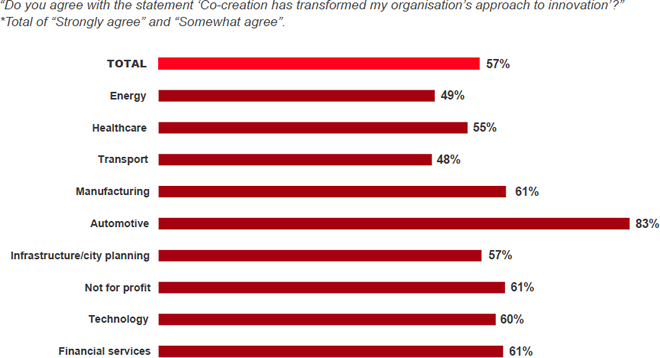By sector, the automotive sector is the most likely to say that co-creation has transformed their approach to innovation.

This is perhaps unsurprising given that the cost of designing and manufacturing a new vehicle is so prohibitive, which puts the onus on manufacturers to give their products the best possible chance when they're released onto the market.
The automotive sector is in the middle of a radical shift, as a number of transformative factors converge. Connected cars are becoming increasingly commonplace, and a driverless future for the automobile looms large on the horizon. The biggest fear for carmakers is that the public will stop viewing cars as a desirable product, and begin to see them as a service. It's this desire to continue creating relevant and attractive products that is spurring the automotive sector towards co-creation.
Crucially, progressive car makers are no longer relying on simplistic market research or focus groups when testing the potential of new products. Instead, they are sourcing consumer feedback at the design stage to ensure that their products meet or exceed market expectation, while gaining a competitive edge over rivals. BMW, for example, has developed a ‘Co-Creation Lab',1 a virtual community where consumers can offer their opinions on its designs, submit their own ideas, and get involved with the development of concept vehicles. This plugs consumers into the design process from inception through to potential completion, giving them a very real and vested interest in the finished product.
The auto sector has also reached out to key internal and external stakeholders, including suppliers, dealers and employees. For instance, Ford's Aligned Business Framework was launched in 2005 to enable it to share information with suppliers at the earliest stages of design. The aim was to boost trust, transparency and supply-chain efficiency and it has subsequently led to closer working relationships, earlier access to innovative supplier-sourced design features2 and, importantly, lower production costs. CSR Europe, the business network for corporate social responsibility, runs a working group on supply-chain sustainability that brings 12 European car manufacturers together to enhance sustainability in their supply chains3. While more work still needs to be done within the auto sector – perhaps surprisingly, only 67 percent of automotive firms in our survey believe they have the right culture for co-creation – the success of its existing collaborative projects offer proof that co-creation can benefit all.
While there are clearly some great examples of co-creation in action across sectors such as energy, healthcare and transport, in general, these sectors have some work to do if they want to achieve the same levels of performance as in the automotive sector. For example, while 38 percent of automotive sector survey respondents say they collaborate with non-competitors in their sector ‘often' or ‘all the time', only 25 percent of energy and healthcare sector respondents say this, and only 17 percent of respondents from the transport sector. Industry collaboration has taken the auto sector strides ahead in terms of setting common standards and working to solve some of its bigger challenges, like driverless automation and fuel efficiency. By learning lessons such as these, healthcare, energy and transport companies could stand to make the same leaps.